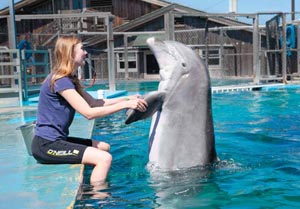Campus News
Dream job
A student writes about her experience caring for, and learning from, UCSC’s marine mammal “animal ambassadors”


Editor’s note: As part of the Student Issue, we asked a student to write a piece forus. We hope this first-person by Maia Goguen gives you an up-close look at what it’slike to be one of the student volunteers who work tirelessly, 365 days a year, caring for animals in the Marine Mammal Physiology Project. Volunteers gain a breadth ofexperience ranging from animal care and husbandry practices to data collection and hands-on animal training with a variety of marine mammals and exotic birds.
It’s 7:30 on a Saturday morning and I am having a stare-down with a sink full of dead fish.
Two years ago this would have seemed strange to me because, 1) I’m awake at 7:30 on a Saturday morning, an event unimaginable for most college students, and 2) I’m next to a sink full of dead fish.
This, however, is not part of a strange dream, but rather a first step in “bucketing,” one of the many morning tasks volunteers perform at the Marine Mammal Physiology Project (MMPP), a UC Santa Cruz lab under the direction of marine biologist Terrie Williams.
The MMPP studies the physiological, energetic, and biomechanical parameters of several marine mammal species, and the sink full of fish will be breakfast for the lab’s animal residents. MMPP is home to Primo and Puka, two Atlantic bottlenose dolphins; Taylor, a Southern sea otter; and KE-18, a Hawaiian monk seal. Three cockatoos, Junior, Mary, and Wiki, and two cockatiels, Shadow and Savannah, live here, too.
MMPP has also been my home, at least 20 hours a week, for the past two years, but I am a small part of the MMPP workforce. You know the saying, “It takes a village to raise a child.” Then what does it take to raise nine exotic animals? The MMPP community!
After finishing bucketing we move on to other daily “chores” like checking the temperature and water quality of the pools, scraping algae (and feces) off of pool walls, and cleaning everything, from bird food bowls to buckets filled with fish juice.
It is dirty and tiring work, but I would choose all of it over cleaning my room any day. These tasks are essential for the health of the animals, the primary concern for everyone at the lab, and are actually fun when you do them with friends.
Throughout the day we also work to keep the animals enriched, or mentally healthy, by picking out toys, introducing them to novel things, and being creative in our interactions with them.
Then comes everyone’s, especially the animals’, favorite part—feeding! Feeding sessions use the animals’ daily food as a motivator to enforce good “table manners” or behavior, and train many husbandry behaviors, including weighing, blood sampling, and exercise, and research behaviors, including diving and sitting under a metabolic dome for oxygen consumption measurements.
The animals voluntarily perform all research and husbandry behaviors. MMPP trainers also use these sessions to teach volunteers about feeding, training, and research techniques. As an assistant trainer, I now get to feed and train these amazing animals!
I am constantly learning ways to improve my communication and training abilities in different situations and with different species, skills that are necessary for a career in animal care and training. I have also been able to watch and participate in research sessions and have had the opportunity to apply the training and research knowledge I have gained while working with MMPP to my own study on the metabolic rates and assimilation efficiency of cockatoos.
This applied research experience will help me with my goal of going to graduate school to continue biological and conservation research.
MMPP has taught me the importance of teamwork, both with animals and other people. It is inspiring to see what we all can accomplish together!
I would like to thank Professor Terrie Williams for this opportunity to learn and live my dreams. I would also like to thank Traci Kendall, Beau Richter, and Courtney Ribiero-French for their guidance, care, and patience. Lastly, I would like to thank the rest of my MMPP family: Hilary Mills, Donna Beckett, Bryan Tom, Breanna Beck, Nick Alcaraz, Caitlin Carrington, Meagan Davis, Margaret Cummings, Noel Fong, Vicky Karabanova, Hannah Blaisdell, Laura Francisco, Kim Kendig, Travis Trihn, Aubrey Sanders, Melissa Sigala, Krista Rigsbee, Janelle Lundin, Victoria Hess, Danna Jackson-Molidor, Leann Castle, and Amber Diluzio for all of their love and support for the animals and each other.